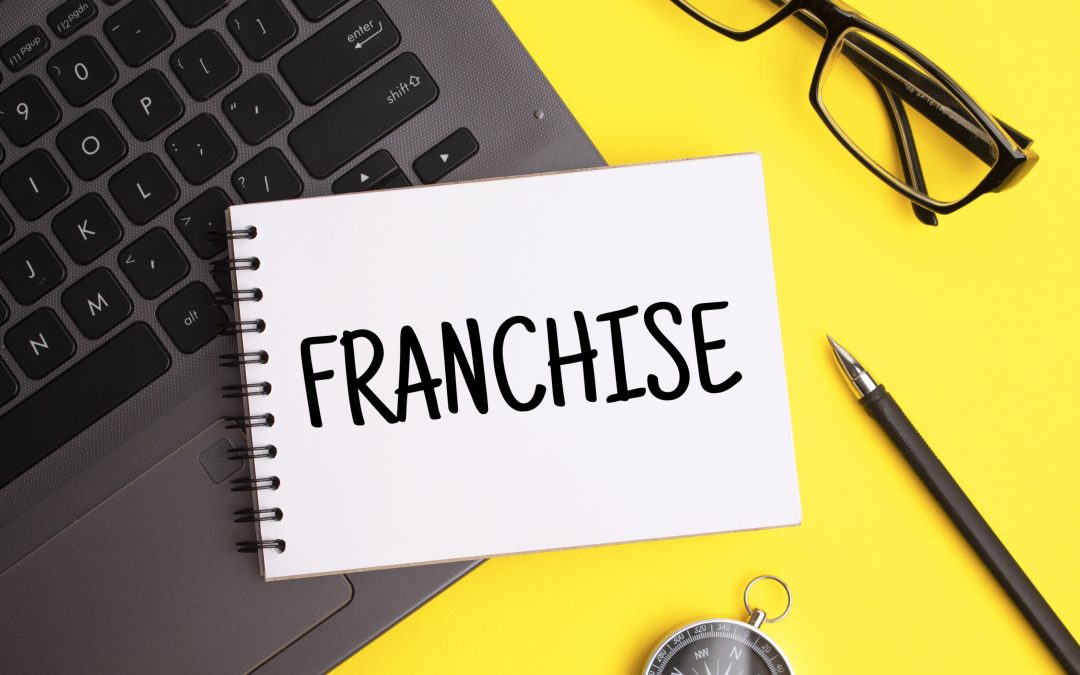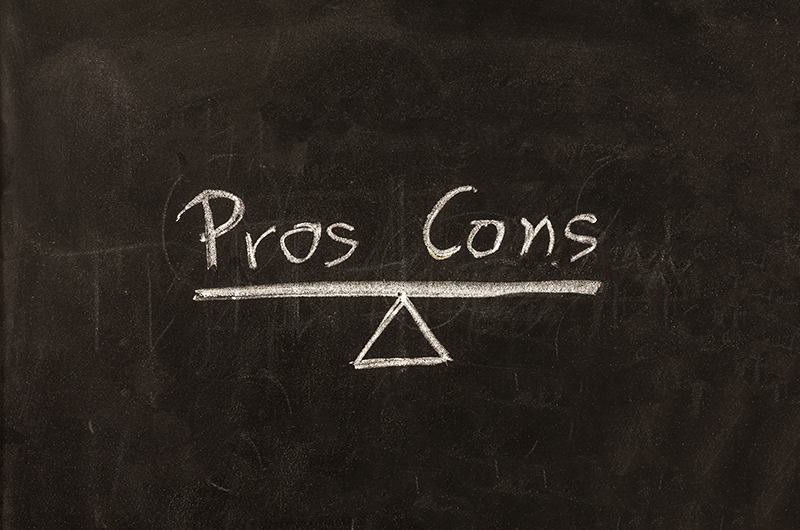
by Matthew Reap | Nov 25, 2019 | Advice
As explained in the introductory article of this series, What Is Franchising?, a franchise is a unique and inclusive business concept. One that allows budding entrepreneurs to launch their own business venture, under the name of an already-established company. The main benefits of starting a business this way are structure and support, and having the help and guidance from experts in the industry.
When you open a franchise, you will have everything you need to run a successful business. Including a proven business plan, tried and testing marketing techniques, systems and processes that are up and running, and often, free advertising.
Because of these business comforts, franchises are generally considered to be relatively fail-safe. But what exactly is involved in opening a franchise, and how does franchising work?
While franchise businesses offer multiple advantages, they are just as challenging as any other enterprise. It is essential for franchisees to understand how the concept works and what is expected of them if they want to be successful.
Here, we share our knowledge on how franchising works and the different phases of the franchise process.
How It All Works
The first thing to understand is that there are three different forms of franchising. A franchise can refer to one of the following:
- A distributorship – an agreement that allows an independent business the right to sell a company’s products.
- Trademark / brand licensing – an agreement that allows a business to use a company’s trademark or brand name.
- Business format franchise – an agreement that allows a business to operate with a company’s trademark, products and entire business format.
Common examples of distributorships are car dealerships, such as Mazda, Land Rover or Maserati. While trademark licensing is seen with brands such as Coca Cola or sports franchises. But the most common form of franchising is the latter, which is what we’ll be talking about here.
Read on to find out how business format franchises work:
Firstly, let’s discuss what costs are involved in buying a franchise. With a business format franchise, the franchisee is expected to pay an upfront fee to the franchisor. This one-off, initial payment is required so the new business owner can buy the rights to do business under the trade name of the parent company.
Fees can vary greatly, depending on the size and complexity of the business. Start-up costs can be as little as a few thousand pounds for something small like a vending machine franchise, a cleaning company franchise, or a fitness class franchise. Or you could need over a million pounds for famous fast food enterprises, such as Taco Bell, Pizza Hut and McDonald’s.
It’s true that franchising isn’t usually cheap to set up. But the fee usually includes everything from training for your management team and help with recruitment, to all the necessary equipment and business systems to get you started. The license fee covers all of these things, elements which would be hard to finance and hard to install on your own.
In exchange for training and setup, you are giving your promise that you will follow guidelines and represent the brand in the right way. After the initial training, ongoing support from the franchisor will ensure that you and your staff stay within the intended structure set out for you.
If you’ve ever wondered why McDonald’s burgers taste the same wherever you go, or why every Costa Coffee in the country has the same cake selection, it’s because of franchising. Food-based franchises in particular run a tight ship when it comes to product distribution. Some entrepreneurs may argue that this format doesn’t give you much flexibility, while others find that the product structure makes stock management much easier.
Everything you sell will be researched, developed, produced, packaged and marketed by your parent company. For people with no former experience, this can be a simple, stress-free, and low-risk way of becoming a business owner.
The Franchising Process
The road to becoming a franchise owner can sometimes (although not always) be a long, drawn-out process. The whole thing can take anywhere from 6 to 12 months for bigger, more complex businesses. But many of the smaller franchising opportunities these days can be completed within a matter of weeks.
To simplify what happens next, here are the different stages to the franchising process:
Look into the type of franchise you would like to buy and make contact with the relevant people to get the ball rolling. You may want to consider talking to a franchise consultant if you want a bit more guidance along the way, but this is not necessary. This is also the time to work out what kind of franchise you can afford.
Once you’ve decided on your franchisor, it’s time for a thorough due diligence investigation. This includes both qualitative and quantitative research on the company. A qualitative analysis should look at things like strength of the brand, length of time in business, and potential growth. Then quantitative analysis looks at the money side of things. You should be asking questions like “When can I expect to break even?”, and consider the cost of employees and other ongoing costs.
Creating a business plan will help you get funding from lenders. Not only that, but it will also help you share your vision for your business, and will help you set business goals for the next few years. At this point, you will need to secure adequate funding before you can move ahead.
This is the part where you sign the agreement and obtain all the necessary permits (if there are any). Once this step is done, you will legally be able to be do business under the trade name of your chosen company.
Once you have the legal elements sorted, you can hire staff or get training for yourself if you’re the only one working on the business. Normally, there’s a dedicated franchise manager (or a support team) who will be on hand to help you with everything from branding to operations.
After getting yourself and/or your staff up to scratch with the new brand and company guidelines, you can launch your new business!
The Franchise Agreement
Going back to step number 4 in the franchise process is the franchise agreement. This is a very important document, one that you shouldn’t take lightly or skim over. If you have been seeking legal advice, this is when your solicitor will come in handy.
Detailed within the agreement will be:
- Franchise regulations – there may be limits to the way you can operate as a franchisee.
- Intellectual property – this looks at trademarks, patents or copyright, and how you can use them.
- Payment provisions – on top of your initial fee, there may be other costs to bear in mind (such as everyday running costs or royalty fees).
- Stock and supplies – details on what you are entitled to / are contracted to stock. It may be that you are required to stock everything the parent company produces.
- Recruitment requirements – some franchisors may specify certain levels of experience or qualifications for anyone working under their brand. They may also require completion of a particular training course before hire.
Assignment on franchise – this explains the necessary process should you decide to sell or close your business. There is sometimes a ‘non-competition’ agreement, which would ensure that the franchisee doesn’t compete with the franchisor anytime in the future.
An Example of Franchising
There are so many different shapes and sizes of franchise business out there. Some are more expensive and elaborate than others. Some are affordable and relatively easy to run, even with very little experience.
If you want to see a working example of a franchise, take a look at one of our earlier articles, How Do Vending Machine Businesses Work? This type of setup is not a complicated or costly one, so it’s a good case study for franchising beginners. It’s also a great read for anyone wanting to know how to start a vending machine business with little to no funding from the bank.
For aspiring business owners in search of a low cost investment (one that doesn’t require a business loan), there are many opportunities out there.
If you want more information on starting a vending machine business in the UK, get in touch with our team today. Call 01795 414 480 or email info@tubzbrands.co.uk.

by Matthew Reap | Nov 20, 2019 | Advice
In very simple terms, franchising is a business strategy. It’s a rather unique concept designed for fast growth and expansion. It’s also one of the most attainable business opportunities for aspiring business owners searching for their lucky break.
If you’ve ever dreamed of being your own boss, but lack the knowledge to start a business from the ground up, franchising could be a great move for you.
A franchise allows you to start your own business with someone else’s trademark, systems, and processes, all in place. Essentially, you’ll be taking on an established name, complete with training assistance, and help with things such as marketing and advertising.
This type of business model is common in the United States, with many of the world’s multimillion dollar franchises based in America. But in recent years, franchising has also grown in the UK.
It is estimated that the franchise industry brings in more than £15 billion to the UK economy. This has been due to significant growth in the last decade, with more and more organisations choosing to distribute this way.
The Meaning of the Word ‘Franchise’
The exact definition of a franchise can be hard to characterise, as there are a number of different franchise structures out there. Distributorships, brand licensing, and business format franchises are all businesses that fall under the concept.
But in the broadest terms (and in the typical business format), a franchise is:
A business that allows other businesses to sell products or services under its trade name. The businesses that sell these products pay for the right to do so, and pay a percentage of their profits back to the parent company. In return, the parent company provides business structures, marketing and advertising, ongoing support and training, equipment and stock.
Where It All Started
Some famous franchises you might already know of are McDonald’s, Subway, and Hilton Hotels. But franchising as a concept dates further back in time, even to the Middle Ages. The first modern franchise came about in the 1880s, when Isaac Singer created the iconic Singer sewing machine. It was a revolutionary sewing machine, one that everyone in America wanted to own. But the problem was, there was only one of him to sell it.
To increase distribution, he sold licensing fees to eager businessmen. The upfront fees helped to boost production and grow the company. While the high demand for his product meant that franchisees were incredibly successful in a short space of time.
Of course, that doesn’t mean that franchising is always easy, or suitable for everyone. To be successful, you need to have all the traits of a top entrepreneur, and you’ll have to spend some time learning how the process works.
Franchising in More Detail
So how does franchising work? And what are the costs involved?
The first thing you need to get to grips with is the franchise process. This process includes all the key steps of opening a franchise, something we will discuss in detail in another article. It can be a long, drawn out process, including everything from choosing a franchise consultant and conducting research to hiring staff and launching your business.
You will also need to understand the ‘franchise agreement’. This is a lengthy document that deals with everything from payment provisions and intellectual property to software and supplies. This has to be looked over carefully, as it’s legally binding and details your rights as the owner.
When it comes to licensing, the price can vary greatly depending on the type of business you want to own. You, the franchisee, will be required to pay a one-off upfront fee, and after that you will have legal rights to trade under the brand name.
With most business format franchises, you will be provided with:
- Help in selecting or developing the premises if applicable
- Brand training for owners / managers
- Ongoing advertising and marketing materials
- Support from a franchise manager
The fees can be anywhere from a few thousand pounds all the way up to £300,000, depending on the size, scale and complexity of the business. But these aren’t the only costs you’ll have to account for, as you may need to pay for stock and there could be ongoing royalty fees to factor in.
Not all franchising opportunities are costly however. Franchises like ours have very low start-up costs, so you can easily find a franchise contract that works for you.
The Benefits of Franchising
There are plenty of advantages to opening a franchise. Not only can you have a ready made (and proven) business process in place before you even begin, but you’ll have access to the company’s expertise to help you succeed. In many ways, you will have control of your own business, whilst also avoiding the risks associated with starting a business from scratch.
For ambitious individuals who want to work for themselves, but worry about lacking in knowledge, this is a good stepping stone.
Franchising is also suitable for people from all backgrounds. You could have a business degree, or you could be a complete business beginner looking for a new challenge. Whatever your experience, franchising allows you to reach your potential with the right amount of guidance and support.
Finding Franchising Opportunities
The great thing is that franchise businesses can come in any shape or size, and there’s usually one to suit every budget and every individual. There are opportunities across multiple industries, including B2B and B2C sectors, so it’s easy to find a niche.
Whether you’re interested in big chain restaurants, or you want to start a small, scalable vending machine business, the opportunities are out there.
With franchising continuing to grow in the UK, 2018 is a good time to search for a company that inspires you.
Industry reports show an all-time record high of 97% of franchise businesses proving to be profitable. Plus, over half of the UK’s franchise businesses are reporting a turnover of more than £250,000. That’s a very small fail rate with high earning potential, making franchising more attractive than ever to budding entrepreneurs.
If you’re interested in reading more about franchising, be sure to keep checking in on the Tubz advice blog. Over the next few weeks, we will we be sharing a series of articles to help aspiring business owners learn more about how it all works, and tips for getting started.
If you want to know how to start a vending machine business, get in touch with our team today. Call 01795 414 480 or email info@tubzbrands.co.uk.

by Matthew Reap | Oct 18, 2019 | Advice
Our handy guide will help you evaluate the pros and cons of a vending machine business and see if it’s worth pursuing.
To know whether franchising is right for you, you need to think carefully about the benefits and risks. Here are the things you need to consider.
The Pros of Franchising
You are your own boss
Although you will be operating under a parent company, a franchise arrangement means that you are the owner. There’s a certain level of autonomy with most franchises, but particularly with smaller operations, such as vending machine businesses.
Established brand and customer base
This is one of the biggest advantages when assessing the pros and cons of franchising. Choosing a business that already has grown a reputation within the industry allows you to flourish on the back of their success. For new business owners with little knowledge in launching new brands, this setup is ideal.
High success rate
Industry reports show that 97% of franchise businesses are profitable. That’s a very high success rate compared to that of a business built from the ground up. According to Forbes, 90% of startups fail. By choosing a franchise, you have a much better chance of surviving even in the most turbulent of markets.
Marketing and advertising support
Some franchisors charge an extra fee for marketing, and others throw in marketing materials as a bundle. Either way, a percentage of your advertising is free as you are running your business on the back of an established brand. But the key thing here is that you won’t have to create your own marketing strategy, as this will be structured and set up for you. Here at Tubz, we offer our franchisees the use of our experienced in house marketing team.
Company training
You will receive some level of training when you buy a franchise. In some businesses, training may be minimal. But at the very least, you will be given guidance on how to run your day to day operations, and how to represent the brand in the best possible way.
Operational advice and guidance
Buying a franchise also means that you will receive business support, however little or large. Most franchisors will have a dedicated phone line or an account manager to ensure that you have somewhere to turn when you have questions. There will also be a network of other franchisees from other regions who you can talk to. In this kind of business, you are never alone with your problems.
Product research and development
The one thing you will never need to think about when running a franchise is sourcing, testing or developing new products. This is all done for you by the company, so all you will need to do is manage your stock. This can save you a lot of time (and money) and allows you to focus on the everyday running of your business.
Franchises for every budget
There are franchise businesses of every size, and some can start from as little as a few thousand to big investments in the millions. It all depends on you, and what you can afford. There are also part-time and more flexible opportunities available to fit in with hectic lifestyles.
The Cons of Franchising
You don’t have as much creative freedom
As we’ve mentioned before, you do have a certain level of autonomy. But when it comes to creativity, there are limits. You won’t be in charge of developing your own products or services, which can be a huge positive in terms of time and cost. But it can also be one of the cons of franchising if you consider yourself to be a visionary.
Rules and restrictions
Once you sign the contract, you will be under obligation to run your business according to company guidelines. In some of the more complex franchises, you may be required to use their systems and software. You will also have certain rules and regulations to adhere to.
Initial outlay can be expensive
All franchises require an upfront cost to buy the rights to operate under the brand. Some franchise businesses, such as fast food outlets, are very expensive and can be £500,000+ to buy. But there are many different types of franchises to consider, including some with affordable bundles that start from as little as a few thousand pounds.
Royalty fees and other costs
There may be other ongoing payments to bear in mind. For instance, some will charge royalties and you may need to pay for marketing materials, advertising fees, or training for new staff.
Dependent on franchisor success
Your reputation can only be as good as that of your franchisor. In many ways, you will be dependent on the parent company in order to be successful. This is why it’s important to assess every franchise opportunity carefully, and find a company you trust and believe in.
Is Franchising Right For You?
Buying a franchise business can be an easy way to become your own boss, with the support of a parent company. And you could boost your earnings whilst fulfilling the self-employed dream. That doesn’t mean that everyone is cut out for it. Like any type of business venture, there are downsides to consider. And we advise anyone looking to invest to think carefully and decide whether the benefits of a vending machine franchise outweigh the risks.
Once you are sure you want to make an investment, you will need to familiarise yourself with the franchising process to understand exactly what is involved.
For more help and advice on things to consider when looking for a franchise business, read our post, Should I Become a Franchisee?

by Matthew Reap | Oct 17, 2019 | Advice
The franchising format is largely an American thing. Think of McDonald’s, Taco Bell, 7-Eleven, Dunkin’ Donuts, Subway, and Hilton Hotels. The world’s most successful franchises began in the US, including the very first modern day franchise business, launched by Isaac Singer, inventor of Singer sewing machines in the late 1800s.
A look back at where it all started shows us just how innovative the concept was. It may be the greatest business model ever created, and the growth of franchising in the UK has been phenomenal in recent years. Stats reveal that the contribution of franchising to the UK economy is £15.1 billion, an increase of 46% over the past decade.
So whilst franchising is still in its infancy here when compared to America, it’s growing fast. There is now more choice than there’s ever been with UK franchise opportunities, with some businesses starting at just a few thousand pounds to invest. If you’re interested in investing, make sure you do your research. Here is a guide to buying a franchise in the UK:
Where to find UK franchise opportunities
Looking for franchise businesses for sale is like looking for any business opportunity. Many of the online directories for businesses now include a section for franchises. There are also some specialist directories, such as Franchise Direct, Franchise Expo and Pointfranchise.co.uk, which let you find businesses from all industries. These websites allow you to search for UK franchises by sector, region, or by investment level. So whether your funds are little or large, you’ll find something suitable.
When looking through directories, be sure to consider the different types of franchises available too. It’s not just big fast food restaurants and automotive franchises that exist today. For instance, there are many van-based businesses in the UK, which offer a flexible way of working. And according to Forbes Magazine, there is also a massive rise in home-based franchise businesses. So there really are many investment opportunities to choose from.
Personal recommendations are the best, as they are the most honest. But you can also actively look for franchise reviews. Some of our franchisee testimonials at Tubz can help paint a clearer picture of what it’s like to own a vending machine business.
Going to Franchise Exhibitions
Another way to look for franchises for sale in the UK is to attend shows and exhibitions. We attend various shows every year, including the UK’s largest, the International Franchise Show, where almost 200 exhibitors gather to provide information about their brands to potential franchisees. The companies with a stand at this event include low-investment businesses like our snack vending franchise, all the way to the big players like McDonald’s, whose upfront costs are over £200,000. So you’ll get a taste of the market at every investment level.
This is us being interviewed at show a few years ago:
https://www.youtube.com/watch?v=ae0iiDoNMUY
We definitely recommend attending these kinds of events before buying a franchise. Not only can you get a better sense of what’s out there and how much it will cost, but you will get the chance to speak to lots of companies in person. Having those face-to-face conversations are really important if you want to make sure the brand is a good fit for you.
Other shows that might be of interest include the National Franchise Exhibition at the NEC in Birmingham, The British & International Franchise Exhibition at Olympia London, or The Franchise Show at London’s ExCel.
Getting Legal Advice in the UK
Once you’re ready to get the ball rolling with buying your first franchise, it’s important to seek legal advice. Don’t use the same solicitor you used to buy your house, as you will need a specialist franchise solicitor who has had experience in this sector. Remember that there can be a lot of jargon and many regulations to understand within the franchise agreement.
Your solicitor can help you check that everything is fair within the document, and that you are getting the best deal. They will help you understand territory rights (such as open territories or closed territories), they will look at any intellectual property and supplier requirements, and they can determine your exit scenario. As well as due diligence, be sure that you have asked all the questions you need to ask before investing. Your solicitor can usually advise on this kind of thing too, but here’s a list of 10 questions to ask before buying a franchise.
When searching for a solicitor, look for one who is SRA regulated or UK BFA approved, or one that is recommended by someone you know. When speaking to other franchisees, you can ask them which legal firm they used. There are a number of directories you can use online too if you are unsure.
Although it’s not absolutely necessary to have a local franchising solicitor, choosing one that is close by will make the whole process go faster when signing documents. But a lot of firms operate by post or with email signing – just be sure to clarify the process before you appoint someone.
For tips in weighing up a franchise investment, take a look at our guide on how to assess franchise opportunities. Or to find out more about Tubz vending machines, contact our team on 01795 414 480 or info@tubzbrands.co.uk.

by Matthew Reap | Oct 16, 2019 | Advice
So you’ve decided to make the leap into franchising! It’s an exciting path ahead, full of opportunity and promise. But there are a few important tips to consider before you take your first step towards success.
- Choose something that suits you.
You will be the driving force of this business. You will be where it starts and finishes. Fundamentally, you will be what makes it successful. So be sure you have picked the right business, the right brand, with an ethos that you can stand alongside and champion. Choose something that you find interesting but don’t choose with your heart, use your head and be mindful of all the things that will influence your business. Assess your strengths and weaknesses and choose with them in mind.
- Speak to a lawyer
This is your very first venture into franchising so it makes sense to talk to an expert. Some of the legalities can be tricky to understand and you will want to ensure all the boxes are ticked, Is are dotted and Ts are crossed. An experienced lawyer can negotiate you the best deal on your franchise agreement, kicking you off with the best possible start.
- Talk with other franchisees
They have walked in your shoes and no doubt will have numerous hints and tips to help make your journey smoother. Take all advice on board and then consider which bits will be useful to your business. But don’t take it as gospel, be sure to do your own research too.
- Consider both upfront and ongoing costs
It is vital that you are aware of all operation costs for your franchise. Here at Tubz, all our vending machine packages are fully inclusive, containing all you need to start your franchise from the offset. But not all companies have the same model so be sure you can cover any future costs also.
- Build a strong team around you
If the business requires more than just you to keep it running at an optimum level, then be sure you hire an effective, knowledgeable and talented team. Remember that your customer will be greeted and influenced by whoever you choose and they will be the face of your business. Choose wisely.
- Be willing to work hard
Your success relies upon your dedicated. Whichever franchise package you choose will require hard work to get off the ground and to keep afloat, so be prepared to put the hours in if you want it to work.
- Never stop marketing
Use as many tools as you can to promote your business. You will, no doubt, be able to find free seminars and workshops locally to help you to do this but also draw from your brand’s resources. Many offer marketing support as part of your franchise agreement. Tubz offer expert business marketing conducted by our inhouse team as part of our vending machine franchise costs, including contacting prospective site owners on your behalf.
The flexibility and variety of franchise packages available means that with some dedication and a thought-out approach, you can efficiently find the opportunity that best suits you!

by Matthew Reap | Nov 18, 2016 | Advice
People come to franchising from all walks of life. For some, it’s the first step on the road towards entrepreneurship. For others, it’s an opportunity to be their own boss. Some franchisees enter the role with the goal of generating additional income through a flexible system they can fit around their lifestyle. (more…)








